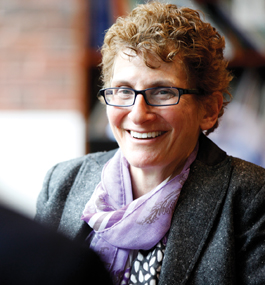Back Home to Heller

Mike Lovett
Joan Dassin ’69
A lot has changed since Joan Dassin ’69 graduated from Brandeis. The student body is larger. The scratching of pens in classrooms has been replaced by clicking keyboards. Ford Hall is gone. But the spirit of social change is alive and well, she says. In fact, it’s one of the reasons she came back.
Last summer, Dassin took over as director of the Sustainable International Development (SID) program at the Heller School for Social Policy and Management after founding director Laurence Simon stepped down.
“One reason I feel so comfortable coming back to Brandeis,” Dassin says, “is because that empowerment and excitement we felt in the 1960s is part of Brandeis’ DNA — particularly in the DNA of the Heller School.”
Previously, Dassin served as the founding executive director of the Ford Foundation International Fellowships Program, a global scholarship program for social justice leaders in the developing world.
An English major at Brandeis who earned a PhD at Stanford in modern thought and literature, Dassin discovered her passion for development when she first traveled to Brazil in 1971.
There, at the height of the country’s military dictatorship, she saw firsthand how state-sponsored terror created a culture of fear and intimidation. When she returned to the U.S., Dassin became involved in human rights causes and worked on behalf of Brazilian exiles.
“Over time, I came to understand how civil and political liberties were connected to economic opportunities and cultural rights,” Dassin says.
Understanding how these issues intersect is an invaluable skill for development professionals, she believes.
“In SID, we are training future development leaders not only by teaching them the technical skills they need to manage projects, but also by teaching them that development is a historical and political process, where solutions can’t be automatically transported from one place to the next,” Dassin says.
“I’m proof that people come to development from many different paths,” she says. “There is no dominating perspective, and that’s what makes it interesting.”
— Leah Burrows
